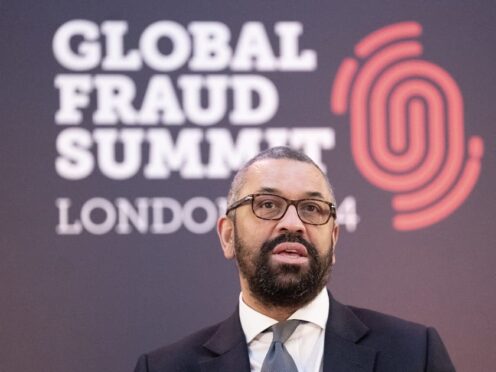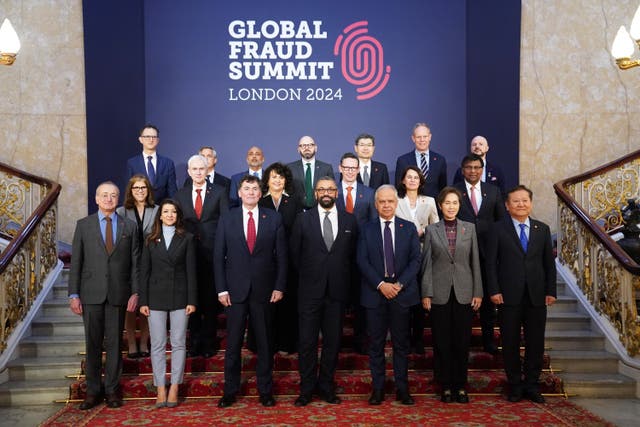
The Home Secretary has hailed a pledge by world leaders to unite to fight fraud as a “massive step forward” in efforts to crack down on the crime.
The agreement was signed as representatives from governments of the Five Eyes intelligence partnership – the UK, US, Canada, Australia and New Zealand – as well as those from France, Germany, Italy, Japan, Singapore and South Korea attended a summit in London.
James Cleverly, who hosted the event at Lancaster House, told broadcasters the move was to make sure “international crime has an international response” as the countries promised to fight fraud together.

The National Crime Agency (NCA) and US law enforcement bodies including the FBI and the Secret Service also vowed to target scam call centres.
Mr Cleverly said: “We’ve been clear that the global community needs to unite to fight fraud head on and this communique is a massive step forward.”
Formally opening the summit, he warned fraud was “evolving” and fraudsters were “taking advantage” of modern technology – with much of the crime taking place online.
Although acknowledging fraud was a “huge challenge”, Mr Cleverly told delegates: “We mustn’t be despondent, we mustn’t be fatalistic,” adding that “collective efforts” to grip the crime will make sure fraudsters do not succeed.
As he stressed the UK’s commitment to crack down on fraud, he said: “We won’t ever be complacent or take our eye off the ball.”
NCA director general Graeme Biggar told the summit fraud is one of his “biggest worries” among all the serious and organised crime threats he is responsible for tackling in his role.
“That’s because of the scale of the threat and the mismatch between that and our response at the moment. It is not where we need to be,” he added.
Fraud represented 38% of recorded crime in the UK last year, affecting three million victims and costing them £2.5 billion, he said.
Interpol has warned fraud is often perpetrated by organised criminal groups, including human traffickers, who force people to work in scam centres which target potential victims across the world, while a forthcoming threat assessment is expected to show a concerning rise in fraud in all corners of the globe.
Around 70% of fraud offences in the UK have ties to international criminals, with £3 billion lost to overseas accounts last year.
As part of the international agreement each nation recognised fraud as an “organised, transnational threat” that has become “one of the most prevalent global issues” and agreed to work and will work to a four-point structure to “protect citizens and target organised criminals” in a bid to combat fraud, according to the Home Office.
Countries have promised to share more intelligence and resources as part of efforts, as well as working with banks and other businesses to prevent fraud.
The communique recognises that the impact of fraud is “devastating and universal across the world”, even if the specific types of crime vary, and paves the way for international law enforcement bodies to work more closely, the department said.
Nations will look at ways of recovering illicitly gained assets and returning funds to victims in different countries. Leaders will also explore using sanctions and visa bans in a bit to disrupt organised crime groups.
Tech firms including Amazon, Apple, Google, Meta, TikTok and LinkedIn were also in attendance at the first summit of its kind, alongside banks HSBC, NatWest, Santander, and other financial organisations including Visa.
Leaders made clear social media companies and other online forums are expected to take further action to prevent fraud, including identifying and removing fraudulent posts, the Home Office added.
The event continues on Tuesday.

Enjoy the convenience of having The Sunday Post delivered as a digital ePaper straight to your smartphone, tablet or computer.
Subscribe for only £5.49 a month and enjoy all the benefits of the printed paper as a digital replica.
Subscribe